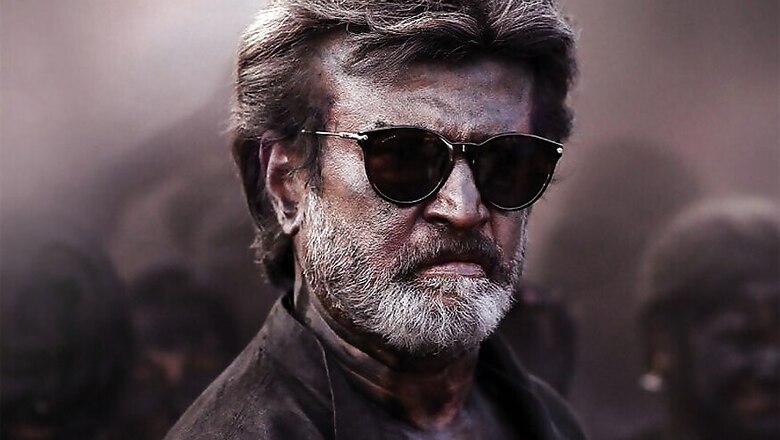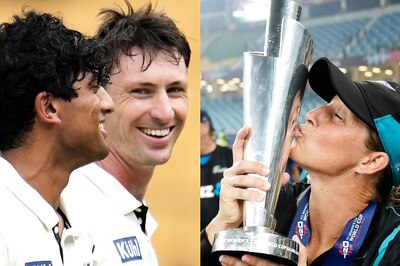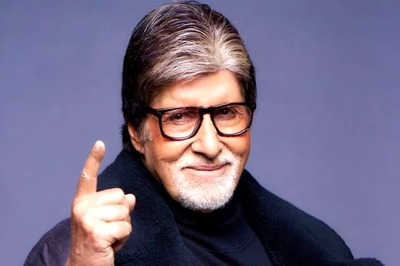
views
Come June 7, and yet, another Rajinikanth-starrer, Kaala, will hit the theatres. Nothing very new about this, but what may be different this time is kind of reception the film will get, given that this will be the South Indian superstar's first movie to hit the screens after he had announced his decision to step into the political arena. After years of procrastination, Rajinikanth finally said yes to his long-hidden political ambition. That he is yet to form a party or even spell out what his agenda would be, except to say that his would be “spiritual politics" (whatever this may mean), may have already put off some of his admirers.
Be that as it may, having spelt out his move to enter politics, Kaala will come under minute scrutiny. Political parties like Dravida Munnetra Kazhagam, All-India Anna Dravida Munnetra Kazhagam (AIADMK), Bharatiya Janata Party and even the Congress will be watching the kind of reception Kaala garners in Tamil Nadu, and maybe elsewhere.
Unfortunately to begin with, the film may not have a smooth opening. Rajinikanth's utterances which seemed to justify the police firing – which killed 13 people – during the anti-Sterlite copper smelter plant protests in Toothokudi or Tuticorin were lambasted. For, they were seen as echoing the ruling AIADMK stand on the issue. In a way, Rajinikanth appeared brutal when he quipped that the demonstrations were “turning Tamil Nadu in a graveyard".
And when Pa Ranjth, Kaala's director, came to his hero's rescue, he got the flak as well, and soon social media was abuzz with “Boycott Kaala" messages.
The story is not different in the neighbouring State of Karnataka, where Rajinikanth's statements on the Cauvery issue ( a perennial problem between Tamil Nadu and Karnataka with each fighting for a just share of the river water) have angered the people, who view the superstar as one of their own, and hence expect him to stand by them in this battle. Rajinikanth was born in Bengaluru.
Admittedly, these factors may work against Kaala, but I would think that there could be a far more important reason if the movie were to fail or not do as well as expected.
I think -- and many will agree agree -- that Rajinikanth's mystique is on the wane. As one who has watched him since his first film, Apoorva Raagangal, in 1975, I can say that despite all the rush to get a movie ticket for his releases, there is a perceptible dip in his popularity. And obviously so. Rajinikanth has done little to present anything different in the past decade and more.
Many years ago, he mesmerised the ticket-paying masses with his magic. When he flicked a cigarette in the air and caught it between his lips, his fans roared in applause. But like a magician whose tricks tend to get jaded with time (a classic example of this being men like P C Sorcar Junior, whose shows no longer draw the kind of patronage they once did), Rajinikanth's performances, inspite of his elaborate efforts to look young and look different through make-up, have begun to bore us. His 2014 Lingaa crashed, and he had to return money to angry distributors. Some of his other films did not fare the way his earlier works jingled the box office.
So, it is not surprising that an actor knocking 70 and with a low health quotient (some years ago, he was in a Singapore hospital for several weeks), his upcoming Kaala may well be a do-or-die situation for a man who began his life in poverty and whose beginning as a bus conductor in Bengaluru were hard.
Strangely, Rajinikanth -- who once had the guts and imagination to throw away the khaki uniform of the conductor and walk into floodlights and flashbulbs and greasepaint and glamour -- now appears to have gone weak in his knees. One is never sure whether it is his family of wife, two movie-making daughters and an actor son-in-law and his producers who have been cajoling him to conform – perhaps imprisoning him in the confines of conservatism. Which, in other words, means walking the beaten path. But this is not fetching the kind of returns which the superstar, often addressed reverentially as “Thalaivar", commanded once upon a time.
A good example of this could be Kabali in 2016. Despite massive publicity for this work by Pa Ranjith, the film disappointed both critics and the man on the street. The helmer had said time and again that he would transform the superstar into a super actor, and many of us had hoped that we would see the old Rajinikanth once again, the Rajinikanth which directors like Bharathiraja, Balachander and Mahendran had created for their extraordinary movies.
But as I walked out of an early morning screening of Kabali, there was disappointment writ large on the faces of viewers. Even during the show, there was silence, except for the first 10 minutes when one saw Rajinikanth emerge out of the prison after a 25-year incarceration — suited and booted. This was certainly unusual for any Tamil film with any star worth the name, and the kind of din spectators (girls included) created made it almost impossible to follow what was being spoken on the screen. But the silence during Kabali was disturbing in a different sort of way.
In spite of all this, one may still see fan frenzy at the opening of his movie: huge wooden cutouts of the actor garlanded with fresh flowers and anointed with milk and sandalwood paste. There may still be a craze for his first shows, the tickets at exorbitant rates vanishing in a wink.
But somewhere the colour may have lost its glow. Somewhere, there could be a yearning amongst his well-wishers that their hero would re-emerge as an actor -- which many of us saw in the 1970 and the 1980s.
Born Shivaji Rao Gaekwad in Bengaluru to Marathi parents, Rajnikanth got his first break in 1975 with Apoorva Raagangal. But it was J. Mahendran’s 1978 Mullum Malarum that gave him the star tag. His acting prowess in these two films was brilliant, where portraying shades of grey, he could still hold our attention.
Mullum Malarum lifted him to the skies all right.
One often pauses and ponders, where is that Rajinikanth. Why has he disappeared in a cloud of gimmickry, whose novelty has worn off.
This is where some of the Bollywood actors like Amitabh Bachchan and Rishi Kapoor have scored. Bachchan completely reinvented himself in a variety of ways, each time disappearing into a different character. Cheeni Kum, Aarakshan, Satyagraha, Black, Paa, Piku, Te3N and Wazir have amply proved that here was a man willing to move with times, even if that meant letting go an avatar which had made him, in the first place, a celebrated star. Gone was that angry young man of Zanjeer, gone was that lover boy of Silsila. Bachchan drew the drapes over these characters to become a proud restaurant owner in London, a true teacher, a grieving grandfather and a cantankerous old man with an obsessive bowel syndrome.
And Rishi Kapoor became a gangster in D Day, bidding bye bye to the romantic boy in Bobby. He was fantastic in Shuddh Desi Romance as a marriage broker, he was just wonderful in Kapoor and Sons, though the make-up went overboard. And he was hilarious in 102 Not Out – where as a 70-plus oldie, he provided the thrills along with Bachchan, 102 and going merrily!
If Rajinikanth needs to live on in cinema, he needs to let go an image that has shadowed him for years. One is sure that millions of his fans would love to see him acting out completely different sort of roles.
(Gautaman Bhaskaran is an author, commentator and film critic who has been covering Cannes and many other festivals across the globe for a long time, and he may be e-mailed at [email protected])


















Comments
0 comment